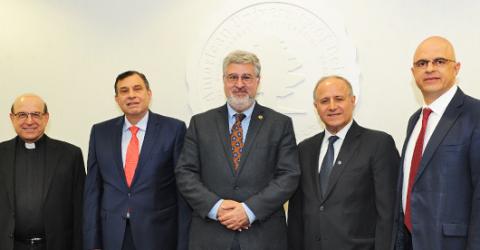
At a signing ceremony at AUB on May 28, 2018, five major Lebanese universities signed the Technology Cooperation Agreement for Research and Education (TechCARE). This historic agreement marks the creation of Lebanon’s national research and education network (NREN).
TechCARE will connect educational institutions within Lebanon and from Lebanon to the world, allowing for enhanced collaboration and improved e-services for the member universities and their communities of researchers and learners.
At the signing event were President Fadlo Khuri of the American University of Beirut (AUB); President Amr El-Adawi of Beirut Arab University (BAU); President Georges Hobeika of Holy Spirit University of Kaslik (USEK); Vice President for Human Resources and University Services Roy Majdalani of the Lebanese American University (LAU), representing President Joseph Jabbra; and Rector Salim Daccache of Saint Joseph University (USJ). The hope is that this is just the beginning and more universities will join the agreement soon.
Overcoming obstacles with creativity
The road leading to this point was not an easy one, but the obstacles encountered were faced with resourcefulness and creativity. Most NRENs around the world begin with infrastructure in the form of a dedicated network connecting universities and research institutions in a given region or nation. Services are then built on this foundation and institutions begin collaborating. But starting with the network proved to be a major stumbling block. Dr. Yousif Asfour, AUB’s chief information officer, explained the novel approach they took to deal with these obstacles.
“Instead of trying to build the physical network so we can build the services and then collaborate, we decided to start collaborating so that we can build the services, and then we can build the network,” explained Asfour. “We flipped it around.”
Collaboration to advance knowledge
The vision of NRENs around the world—and TechCARE in Lebanon—is that building connections and fostering collaborations between a large number of universities and research institutions is key to advancing knowledge. At the signing ceremony, four of the presidents as well as the heads of information technology at the five universities were on hand and explained what this agreement means to their own institutions and Lebanon as a whole.
“Today, informatics is no longer an option, it is a duty,” said USJ Rector Salim Daccache. “A duty that universities have to take into consideration and introduce into their programs in order to benefit our students, and higher education in Lebanon.”
LAU Vice President Majdalani, who represented President Jabbra at the ceremony, commented on behalf of Dr. Jabbra that this agreement is “one more step in building a stronger technology infrastructure for students in leading higher education institutions in Lebanon.” Adding that, “this is vital to foster more innovations, more communications, and more entrepreneurial endeavors.”
Looking to the future, AUB President Fadlo Khuri commented on one of the next steps, which is broadening the membership. “This is further evidence of the level of genuine cooperation between five of the top private universities in the country and our hope is with this step—which will make life easier for our students, faculty, and staff—that the next step will be to work with the major public university in Lebanon,” said Khuri.
BAU President Amr El-Adawi also commented on what he hopes the future will bring, saying: “Today’s signature is a good start for the five universities and I hope this will lead us to more cooperation in other fields.” While a statement from USEK noted that, with this agreement, “USEK will strive to provide unmatched services that will transform the entire educational ecosystem in Lebanon.”
Connecting to the world
The purpose of this agreement is not only to connect researchers and students within Lebanon, but also to connect them to the world. Among the foundational services of TechCARE are the connections it provides to the European community—through GÉANT and its EUMedConnect3 program—and the regional community through the Arab States Research and Education Network (ASREN).
David West, project manager of EUMedConnect3, explained how pleased they were that Lebanon is participating in this EU-funded program.
“GÉANT welcomes the Technology Cooperation Agreement for Research and Education (TechCARE) among Lebanese research and education institutions and is happy to provide the Lebanese R&E community with the benefits from connectivity and services provided under agreements between GÉANT and AUB,” said West. “We look forward to a continuing and growing partnership.”
In addition to this enhanced connectivity, Asfour told us that the TechCARE group will be working on broadening the membership to include other institutions, libraries, and researchers; and developing other collaboration services.
Source: https://www.aub.edu.lb/articles/Pages/techcare-nren.aspx